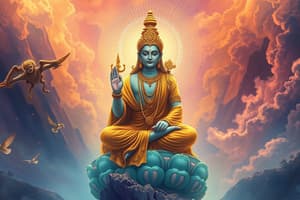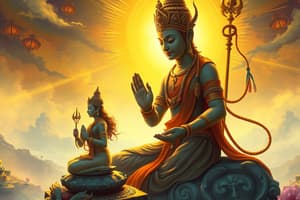Podcast
Questions and Answers
In Buddhism, what are the Four Noble truths
In Buddhism, what are the Four Noble truths
- The principle of self-realization and self-cultivation
- F3ded
- Defef
- The principle stating life is suffering, its causr, elimination, and the path to elimination (correct)
According to Hinduism, what is the goal of an indivual in relation to the self
According to Hinduism, what is the goal of an indivual in relation to the self
- Achievimg Nirvana through meditation
- Realizing the distinction between the true self and the non true self (correct)
- Predicting the Eightfold Path for self-realization
- Experiencing the bipolarity of existense and categories of identity
What is the core principle of Confucian thought regarding the self
What is the core principle of Confucian thought regarding the self
- Ef4g4g
- The principle of reciprocity and proper conduct in relation to others (correct)
- Frv4g
- Crcvr
How does Taoism differ from Conficianism in its view of the self
How does Taoism differ from Conficianism in its view of the self
Which of the following is NOT a characteristic of the Western concept of self
Which of the following is NOT a characteristic of the Western concept of self
How hoes Augustine's view of the self-differ from Plato's
How hoes Augustine's view of the self-differ from Plato's
According to George Herbert Mead, what are the two main components of the self
According to George Herbert Mead, what are the two main components of the self
Which of the followimf disciplines has contributed the most to the understanding of the cultural construction of self
Which of the followimf disciplines has contributed the most to the understanding of the cultural construction of self
According to William James, the Me-Self refers to which of the following
According to William James, the Me-Self refers to which of the following
Which of the following is NOT one of the four core features of human agency according to Bandura
Which of the following is NOT one of the four core features of human agency according to Bandura
Flashcards are hidden until you start studying
Study Notes
Buddhism: Four Noble Truths
- Recognition of suffering (Dukkha) as an inherent part of existence.
- The cause of suffering (Samudaya) is identified as desire and attachment.
- The cessation of suffering (Nirodha) is possible through the relinquishment of desire.
- The path to the cessation of suffering (Magga) is outlined in the Eightfold Path.
Hinduism: Goal of the Individual
- The ultimate goal is self-realization and unity with Brahman, the cosmic principle.
- Emphasis on understanding the true nature of the self (Atman) as being eternal and divine.
Confucian Thought: Core Principle Regarding the Self
- Focus on the importance of relationships and social harmony.
- Cultivation of moral character and virtue through self-discipline and respect for one's roles within society.
Taoism vs. Confucianism: View of the Self
- Taoism emphasizes aligning oneself with the natural order (Tao) and embracing spontaneity.
- Confucianism stresses the importance of social obligations and structured ethics.
Western Concept of Self: Non-Characteristic
- Western self-concept is generally characterized by individualism and personal autonomy, as opposed to collectivist views.
Augustine vs. Plato: Views of the Self
- Augustine integrates faith and inner self-reflection, emphasizing personal relationship with God.
- Plato highlights the realm of forms and the ideal self, focusing on philosophical knowledge and rationality.
George Herbert Mead: Main Components of the Self
- Specified two main components: the 'I' as the spontaneous part of the self and the 'Me' as the reflective aspect shaped by social interactions.
Discipline Influencing Cultural Construction of Self
- Sociology significantly contributes to understanding how social contexts shape individual identity and self-conception.
William James: The Me-Self
- The 'Me-Self' refers to the self as an object of perception, encompassing social identity, personal experiences, and material possessions.
Bandura's Core Features of Human Agency: Non-Characteristic
- Agency refers to self-regulation, self-reflection, and intentionality, but does not include omnipresence as a feature of human agency.
Studying That Suits You
Use AI to generate personalized quizzes and flashcards to suit your learning preferences.



